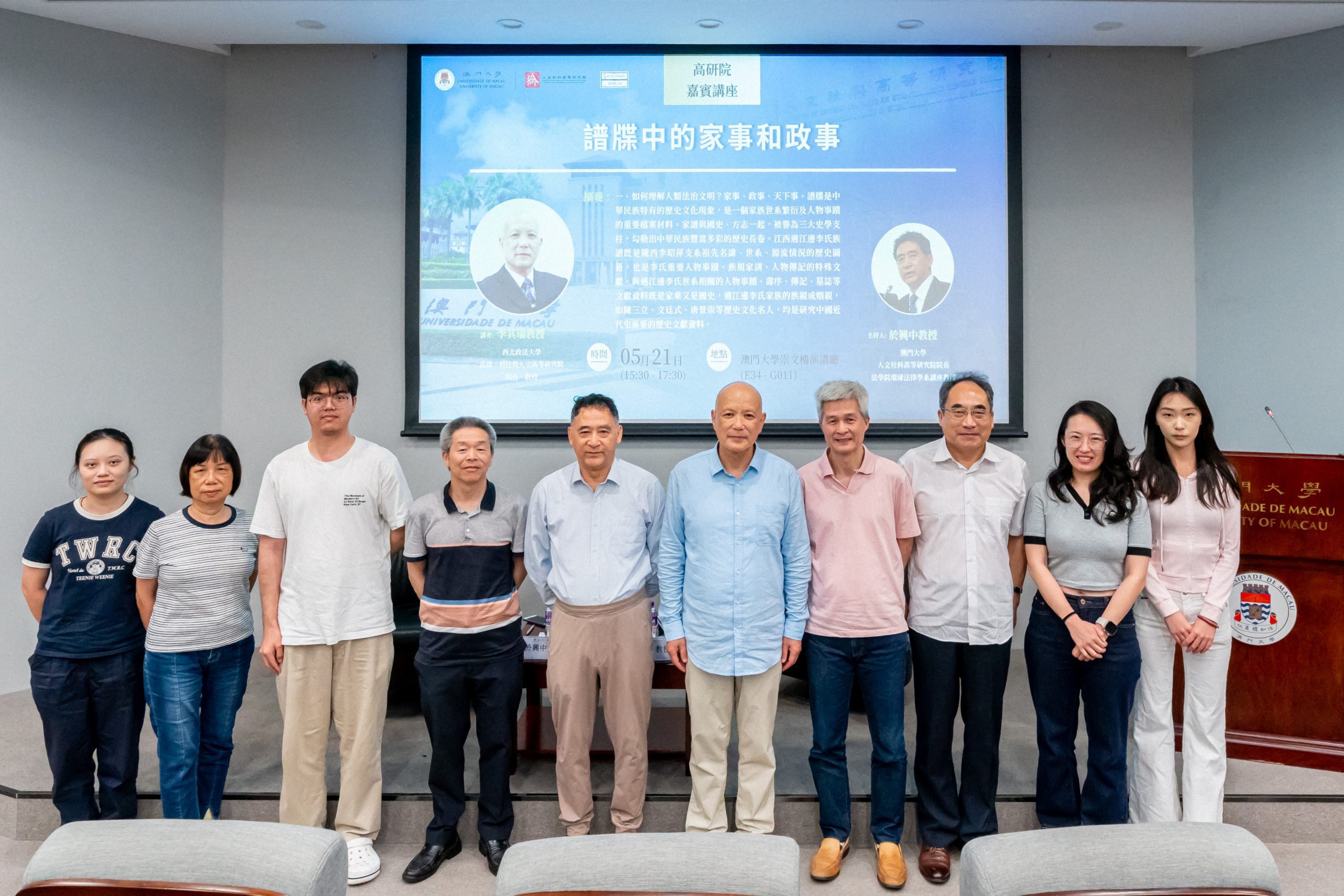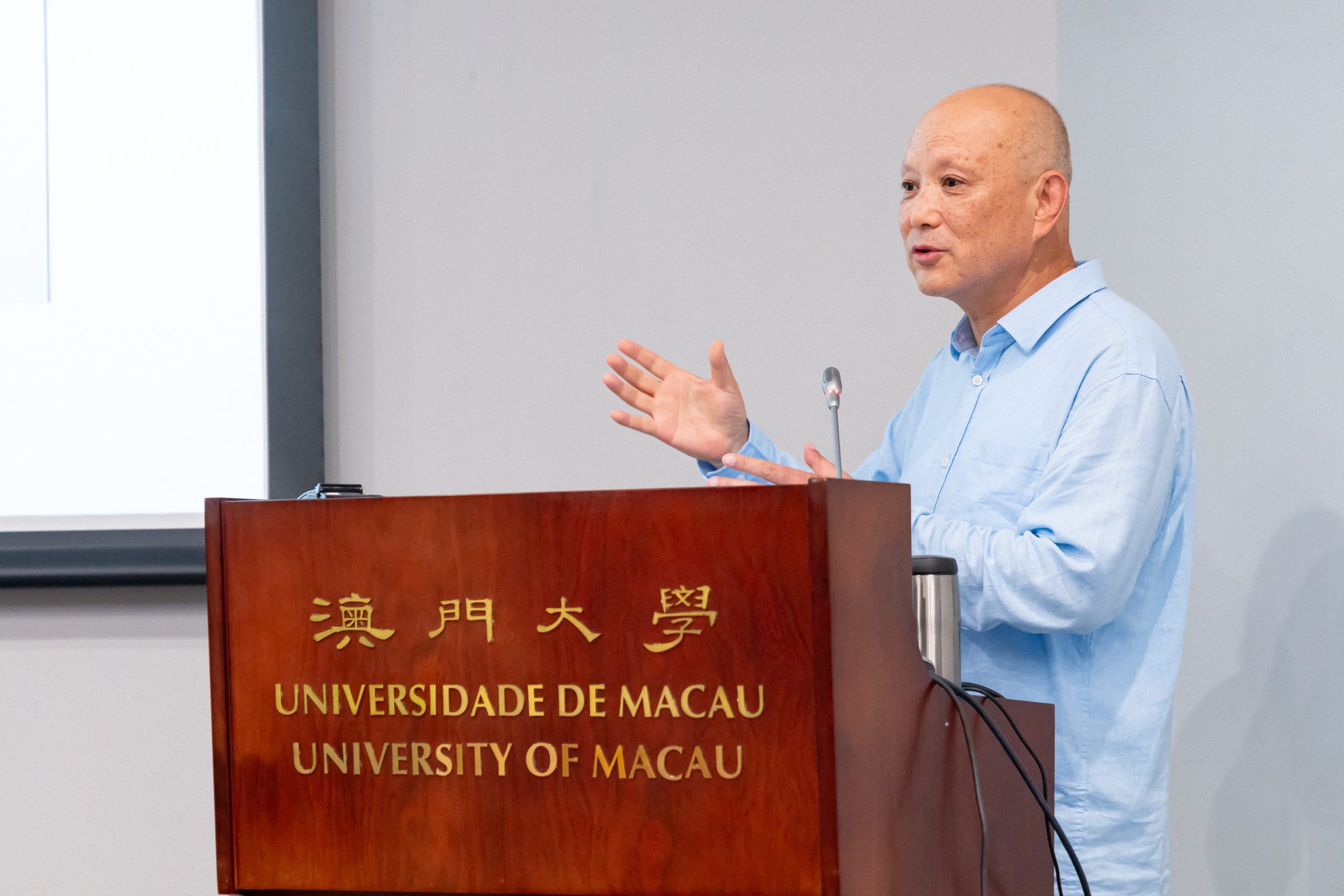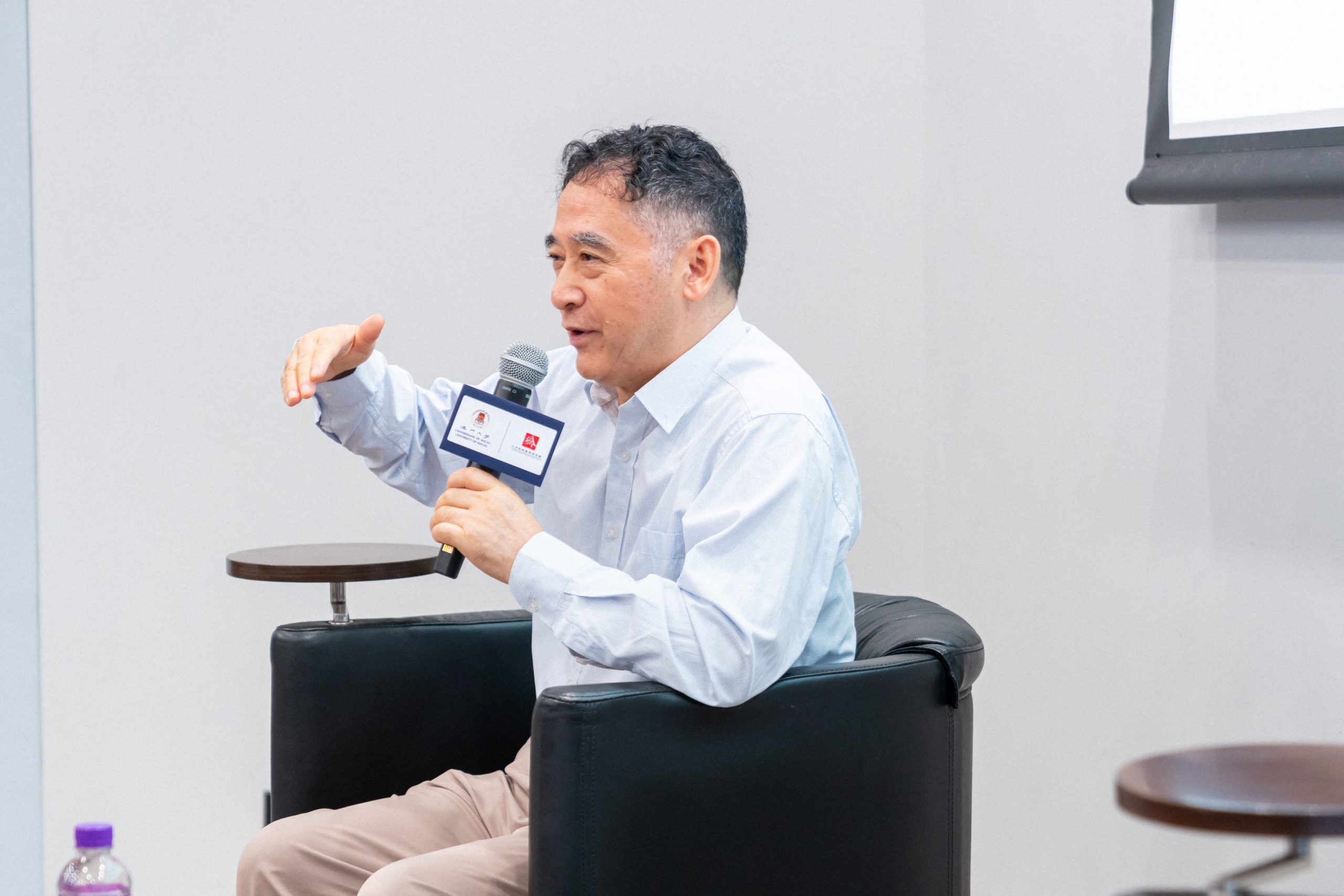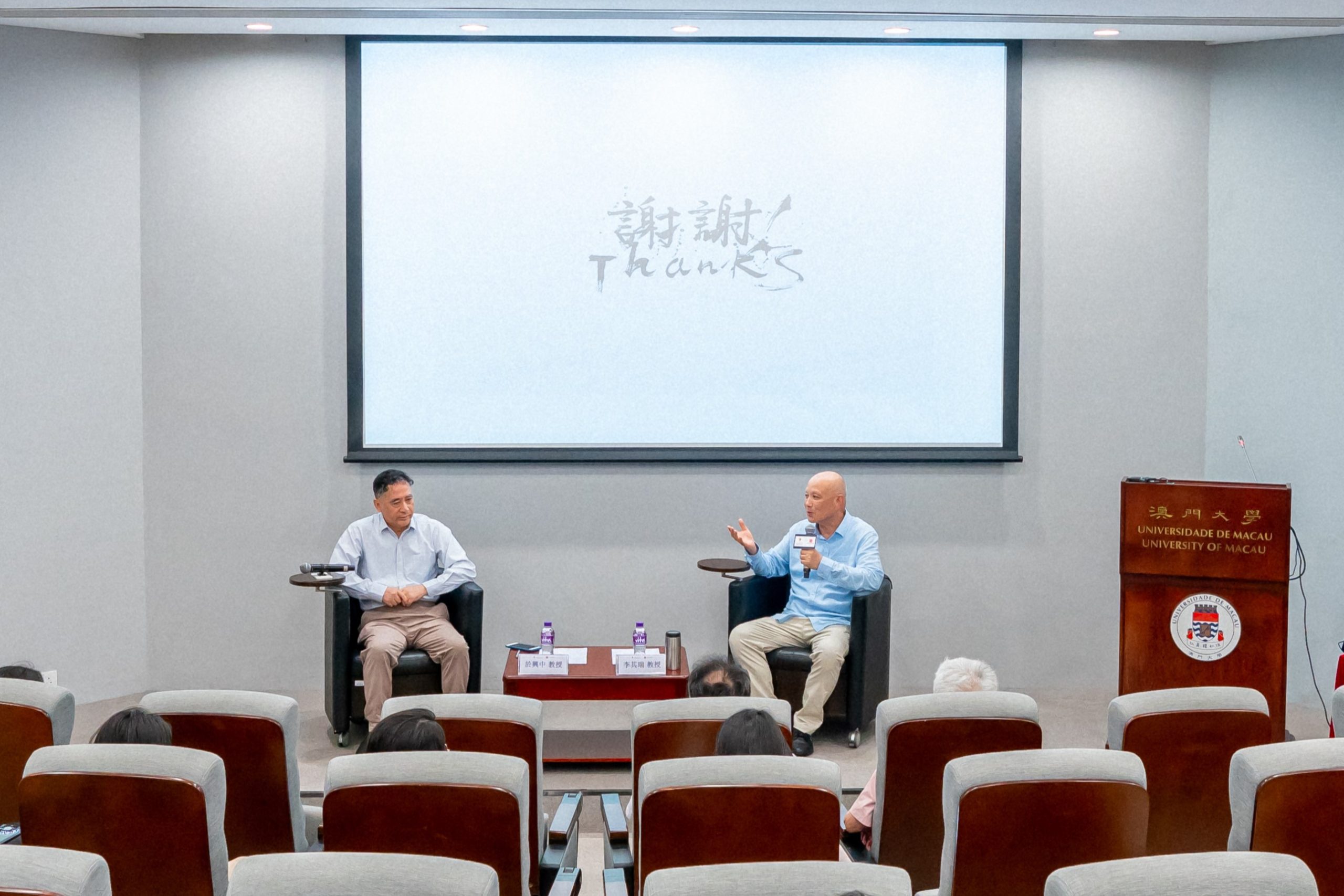【IAS】Guest Lecture: “Family and Political Affairs in Genealogies” was successfully held
【高研院】嘉賓講座:“譜牒中的家事和政事”圓滿舉行

| The IAS promotional video has been launched! We cordially invite you to watch and help spread the word! | ||
|
English |
|
中文 |
 On the occasion of the fifth anniversary of the Institute for Advanced Studies in Humanities and Social Sciences at the University of Macau, we would like to express our gratitude for your unwavering support to us. Your involvement and support have helped build a strong foundation for our interdisciplinary research platform and inspired us to keep moving forward. The IAS is excited to carry on our mission, rooted in Macau, by organizing high-quality academic activities that showcase the diversity of academic collaboration. On the occasion of the fifth anniversary of the Institute for Advanced Studies in Humanities and Social Sciences at the University of Macau, we would like to express our gratitude for your unwavering support to us. Your involvement and support have helped build a strong foundation for our interdisciplinary research platform and inspired us to keep moving forward. The IAS is excited to carry on our mission, rooted in Macau, by organizing high-quality academic activities that showcase the diversity of academic collaboration. |
||
5月21日,澳門大學高研院成功舉辦主題為“譜牒中的家事和政事”的嘉賓講座。主講人為西北政法大學教授,法律、科技與人文高等研究院院長李其瑞教授。講座以週江邊李氏族譜為例,深入介紹了譜牒中的家族紀事與國史進程。本次講座的主持人為高研院院長、法學院講座教授於興中教授。
在講座中,李其瑞教授指出,譜牒體現著血緣與姻親的譜系,官方承認可稱為簿狀,百姓所藏的則曰私書。在歷史長河的發展中,譜牒經盛唐興、戰亂衰,宋起普及平民之家,明清後重倫理教化。
週江邊李氏三修族譜首頁所書的是唐西平郡王李晟,其神道碑的人(李晟)、撰(名相裴度)、書(書法家柳公權)均聞名於世,故被稱為三絕碑。步入近代,清末太子少保李有棻書下李氏族譜濃墨重彩的一頁。其任武昌知府時曾為生民耕漁書陳更換漢陽鐵廠選址。在新聞、教育等領域,他曾創《秦中書局匯報》、撰《湖南釐務匯纂》、輯《續通商條約章程成案彙編》。江寧主政期間,與劉坤一、張之洞共同創辦兩江師範學堂(今南京大學)。任江西鐵路大臣時,更赴九江督工,成為中國鐵路建設的先驅。最後,教授介紹了在李氏族譜中,於清末民初湧現的諸多賢達循良與慈善家,以及十餘個與之聯姻的顯赫家族。
在隨後的討論環節,林少陽教授評論道,晚清文化所佔有的資本的含金量要高於後世,而回亂與田賦、士紳與太平天國的關係也是值得學術研究所關注的。馬慶洲博士則表示一般觀念中家事不輕易示人,在史料缺失時,查找方志、家譜對於論文寫作大有裨益。於興中教授則認為歷史研究既可以沿著望族譜牒順勢而行,亦可以選擇聚焦歷史變遷中的平凡個體。問答環節中,與會者積極提問,就宗族興旺的延續、家族與國家治理之間的關係進行了熱切的討論。
此次講座不僅提供了對週江邊李氏族譜的深入分析,還促使與會者理解譜牒與家國之間的關聯。這場講座無疑為參與者提供了豐富的思想啟發,激發了與會者對史學研究路徑方法的深入思考。
On May 21, the Institute of Advanced Studies in Humanities and Social Sciences (IAS) at the University of Macau successfully held a distinguished guest lecture titled “Family and Political Affairs in Genealogies.” The keynote speaker was Professor Li Qirui, Dean and Professor of the Institute of Advanced Study in Law, Technology and Humanities at Northwest University of Political Science and Law. The lecture, moderated by Professor Yu Xingzhong, Director of IAS and Chair Professor of the Faculty of Law, used the genealogy of the Li clan by the Zhou River as a case study to explore how family records within genealogies intersect with the broader progression of national history.
In this lecture, Professor Li Qirui pointed out that genealogies reflect both bloodline and marital affiliations. When officially recognized, they are referred to as registers; when privately kept by the people, they are termed private records. Throughout history, genealogical documentation flourished during the High Tang period, declined amid wartime turmoil, became widespread among common families starting in the Song dynasty, and increasingly emphasized ethical and moral education during the Ming and Qing dynasties.
The first page of the third edition of the Li clan genealogy along the Zhou River features the Tang dynasty’s Prince of Xiping, Li Sheng. His spirit-way stele—comprising the subject (Li Sheng), the inscription by the renowned prime minister Pei Du, and the calligraphy by the esteemed Liu Gongquan—is celebrated as the Stele of Three Perfections, owing to the distinguished contributions of all three figures. In the modern era, Li Youfen, Junior Guardian of the Crown Prince in the late Qing dynasty, left a vivid chapter in the Li genealogy. As the prefect of Wuchang, he once submitted a memorial advocating the relocation of the Hanyang Ironworks to better serve the livelihoods of farmers and fishermen. In the fields of journalism and education, he founded the Qinzhong Press Bulletin, compiled the Hunan Tax Affairs Digest, and edited the Supplementary Compilation of Treaty Provisions on Trade. While governing Jiangning, he co-founded the Liangjiang Normal School (now Nanjing University) alongside Liu Kunyi and Zhang Zhidong. As Minister of Railways in Jiangxi, he personally oversaw construction in Jiujiang, becoming a pioneer in China’s railway development. Finally, the professor introduced numerous virtuous and philanthropic figures who emerged in the Li genealogy during the late Qing and early Republican periods, along with more than ten illustrious families connected through marriage.
During the following discussion session, Professor Lin Shaoyang commented that during the late Qing period, cultural capital held greater value than in later eras. He also noted that the relationships among the Hui uprisings, land taxes, gentry, and the Taiping Heavenly Kingdom merit scholarly attention. Dr. Ma Qingzhou remarked that family matters are typically kept private, and in cases where historical sources are lacking, consulting local gazetteers and genealogies can be highly beneficial for academic writing. Professor Yu Xingzhong added that historical research can either follow the thread of elite family genealogies or focus on ordinary individuals amid the tides of change. In the Q&A session, attendees actively posed questions, engaging in lively discussions about the continuation of clan prosperity and the interrelations between family structures and national governance.
This lecture not only offered a thorough analysis of the Li clan genealogy along the Zhou River but also deepened participants’ understanding of the ties between genealogical records and the affairs of the state. It undoubtedly provided a wealth of intellectual inspiration and stimulated profound reflection on methodological approaches to historical research.









